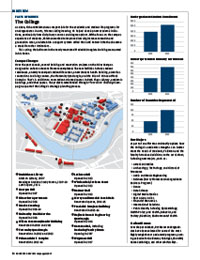In Review
The last day of June marked the end of the tenure of two of Rochester’s academic leaders. Peter Lennie, the Robert L. and Mary L. Sproull Dean of the Faculty of Arts, Sciences & Engineering, and Richard Feldman, dean of the College, both took on their administrative roles in 2006. As dean of the faculty, Lennie oversaw the academic and administrative operations of Arts, Sciences & Engineering, one of the University’s primary academic units, home to more than 350 faculty members, 5,200 undergraduates, and 1,200 graduate students. As dean of the College, Feldman led the academic and cocurricular programs for undergraduates within Arts, Sciences & Engineering.
Beginning in July, Richard (Rick) Waugh, a professor of biomedical engineering, will serve as interim dean of the faculty, while Jeffrey Runner, a professor of linguistics, has been named dean of the College (see page 16). Both Lennie and Feldman will take sabbaticals during the 2017–18 academic year, but are remaining on the faculty—Lennie as a professor in the Department of Brain and Cognitive Sciences, and Feldman as a professor in the Department of Philosophy.

Lennie is credited with leading Arts, Sciences & Engineering through a remarkable period of growth, emphasizing efforts to increase the number of faculty, strengthen research endeavors, and put a spotlight on Rochester as part of a global community.
Improving Academics
As a measure of the academic strength of undergraduates, the average two-score SAT for the entering class for 2017–18 is expected to be above 1,400 for the first time. That puts Rochester students in the 97th percentile for the SAT, a rise from the 86th percentile in 2005. More than 18,000 students applied for admission for the 2017–18 year, up from 11,293 students in 2005.
Strengthening Research Initiatives
As part of a strategic planning effort, leaders in Arts, Sciences & Engineering are developing initiatives that leverage research strengths in traditional and emerging fields. Recent endeavors include:
- Goergen Institute for Data Science brings together faculty throughout Arts, Sciences & Engineering and other units to explore how data can inform research in science, medicine, the arts and humanities, social science, engineering, and business.
- Center for Energy and the Environment, with leadership in the Department of Earth and Environmental Sciences, explores the interaction between Earth systems and energy technology.
- Humanities Center, which has a new home in Rush Rhees Library, supports multidisciplinary engagement with literature, history, the arts, and philosophies of past and present cultures.
- Augmented and Virtual Reality draws on Arts, Sciences & Engineering faculty in the sciences, engineering, and the humanities, as well as other vision-oriented programs across the University, to explore computer-generated environments.
- High Energy Density Physics is an initiative to explore the behavior of matter at pressures many millions of times that of Earth’s atmosphere. The research involves the Laboratory for Laser Energetics as well as engineering and physics and astronomy.
Engaging Internationally
During Lennie’s tenure, Arts, Sciences & Engineering has developed 27 new international agreements for research collaboration and student exchange. Up to a third of undergraduates have an international experience—studying abroad or taking part in research or internships—before graduating. And led by Lennie, Rochester joined the Worldwide Universities Network, a consortium of 20 universities to bring a global perspective to research initiatives.

As dean, Richard Feldman was responsible for the academic and student life programs for undergraduates in Arts, Sciences & Engineering. He helped develop new academic initiatives, particularly interdisciplinary courses and degree options. With a focus on the campus experience of students, Feldman worked to improve diversity, increase retention and graduation rates, and establish a support system called the CARE Network that has become a model for other institutions.
This spring, the ballroom in the newly renovated Frederick Douglass Building was named in his honor.
Campus Changes
Over the past decade, several building and renovation projects on the River Campus designed to enhance student life were completed. The new facilities include student residences, a newly revamped student life center, a new student health building, as well as renovations to dining centers, the Fraternity Quadrangle, and the Brian F. Prince Athletic Complex. That’s in addition to new student-oriented spaces in Rush Rhees Library, academic buildings, and other spaces. The projects were funded through The Meliora Challenge Campaign as part of the College’s strategic planning process.
New Majors
As part of an effort to continually update how the College’s academic strengths can better meet the needs of students, Feldman and the faculty introduced additions to the curriculum, including new majors, such as:
- American Studies
- Archaeology, Technology, and Historical Structures
- Audio and Music Engineering
- Business (Barry Florescue Undergraduate Business Program)
- Dance
- Data Science
- Digital Media Studies
- East Asian studies
- Financial Economics
- International Relations
- Public Health, including Epidemiology; Health Policy; and Health, Behavior, and Society; Bioethics; Environmental Health
Student Honors
Over the past decade, Rochester undergraduates have been selected for some of the most highly sought honor and award programs, earning selection for Goldwater, Fulbright, Churchill, Gates-Cambridge, and other scholarships.

